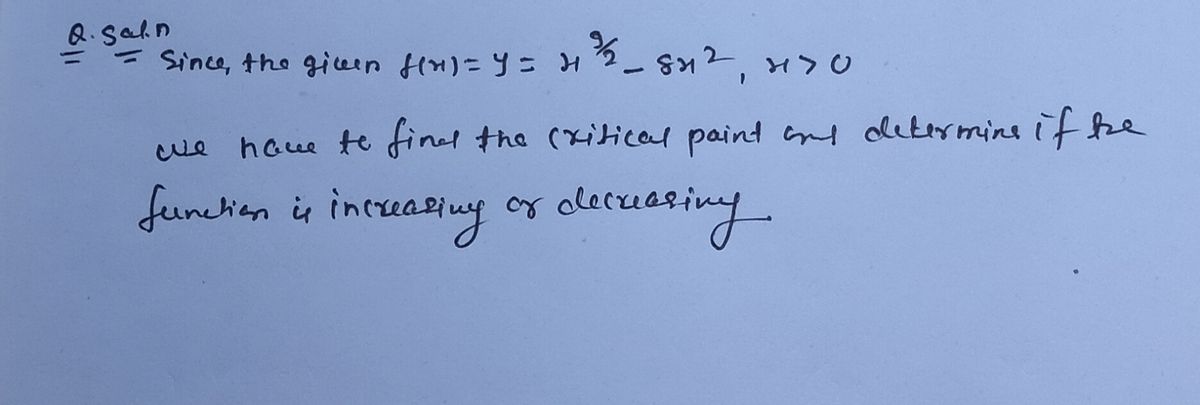Find the critical point and determine if the function is increasing or decreasing on the given intervals. y = x2 – 8x², x > 0 (Use decimal notation. Give your answer to three decimal places.) critical point c =
Find the critical point and determine if the function is increasing or decreasing on the given intervals. y = x2 – 8x², x > 0 (Use decimal notation. Give your answer to three decimal places.) critical point c =
Calculus: Early Transcendentals
8th Edition
ISBN:9781285741550
Author:James Stewart
Publisher:James Stewart
Chapter1: Functions And Models
Section: Chapter Questions
Problem 1RCC: (a) What is a function? What are its domain and range? (b) What is the graph of a function? (c) How...
Related questions
Question
![**Problem Statement:**
Find the critical point and determine if the function is increasing or decreasing on the given intervals.
\[ y = x^{9/2} - 8x^2, \quad x > 0 \]
*(Use decimal notation. Give your answer to three decimal places.)*
**Answer Box:**
Critical point \( c = \) [Your Answer Here]
---
**Explanation:**
The problem requires identifying the critical point of the function \( y = x^{9/2} - 8x^2 \) when \( x > 0 \). A critical point occurs where the first derivative of the function is either zero or undefined.
**Steps to Solve:**
1. **Differentiate the Function:**
- Find \( \frac{dy}{dx} \) by differentiating \( y = x^{9/2} - 8x^2 \).
2. **Set the Derivative to Zero:**
- Solve \( \frac{dy}{dx} = 0 \) to find the critical points.
3. **Analyze Intervals:**
- Determine the behavior of the function (increasing or decreasing) in the intervals defined by the critical points.
4. **Provide the Critical Point:**
- Calculate and present the critical point to three decimal places in the answer box provided.](/v2/_next/image?url=https%3A%2F%2Fcontent.bartleby.com%2Fqna-images%2Fquestion%2Fd5e6f7d9-13e2-4805-b19c-efff4c4b26c6%2F4d351011-3474-49ee-9e85-d9f8ba15f531%2Fr74qnx_processed.png&w=3840&q=75)
Transcribed Image Text:**Problem Statement:**
Find the critical point and determine if the function is increasing or decreasing on the given intervals.
\[ y = x^{9/2} - 8x^2, \quad x > 0 \]
*(Use decimal notation. Give your answer to three decimal places.)*
**Answer Box:**
Critical point \( c = \) [Your Answer Here]
---
**Explanation:**
The problem requires identifying the critical point of the function \( y = x^{9/2} - 8x^2 \) when \( x > 0 \). A critical point occurs where the first derivative of the function is either zero or undefined.
**Steps to Solve:**
1. **Differentiate the Function:**
- Find \( \frac{dy}{dx} \) by differentiating \( y = x^{9/2} - 8x^2 \).
2. **Set the Derivative to Zero:**
- Solve \( \frac{dy}{dx} = 0 \) to find the critical points.
3. **Analyze Intervals:**
- Determine the behavior of the function (increasing or decreasing) in the intervals defined by the critical points.
4. **Provide the Critical Point:**
- Calculate and present the critical point to three decimal places in the answer box provided.
Expert Solution
Step 1

Trending now
This is a popular solution!
Step by step
Solved in 3 steps with 3 images

Recommended textbooks for you

Calculus: Early Transcendentals
Calculus
ISBN:
9781285741550
Author:
James Stewart
Publisher:
Cengage Learning

Thomas' Calculus (14th Edition)
Calculus
ISBN:
9780134438986
Author:
Joel R. Hass, Christopher E. Heil, Maurice D. Weir
Publisher:
PEARSON

Calculus: Early Transcendentals (3rd Edition)
Calculus
ISBN:
9780134763644
Author:
William L. Briggs, Lyle Cochran, Bernard Gillett, Eric Schulz
Publisher:
PEARSON

Calculus: Early Transcendentals
Calculus
ISBN:
9781285741550
Author:
James Stewart
Publisher:
Cengage Learning

Thomas' Calculus (14th Edition)
Calculus
ISBN:
9780134438986
Author:
Joel R. Hass, Christopher E. Heil, Maurice D. Weir
Publisher:
PEARSON

Calculus: Early Transcendentals (3rd Edition)
Calculus
ISBN:
9780134763644
Author:
William L. Briggs, Lyle Cochran, Bernard Gillett, Eric Schulz
Publisher:
PEARSON

Calculus: Early Transcendentals
Calculus
ISBN:
9781319050740
Author:
Jon Rogawski, Colin Adams, Robert Franzosa
Publisher:
W. H. Freeman


Calculus: Early Transcendental Functions
Calculus
ISBN:
9781337552516
Author:
Ron Larson, Bruce H. Edwards
Publisher:
Cengage Learning